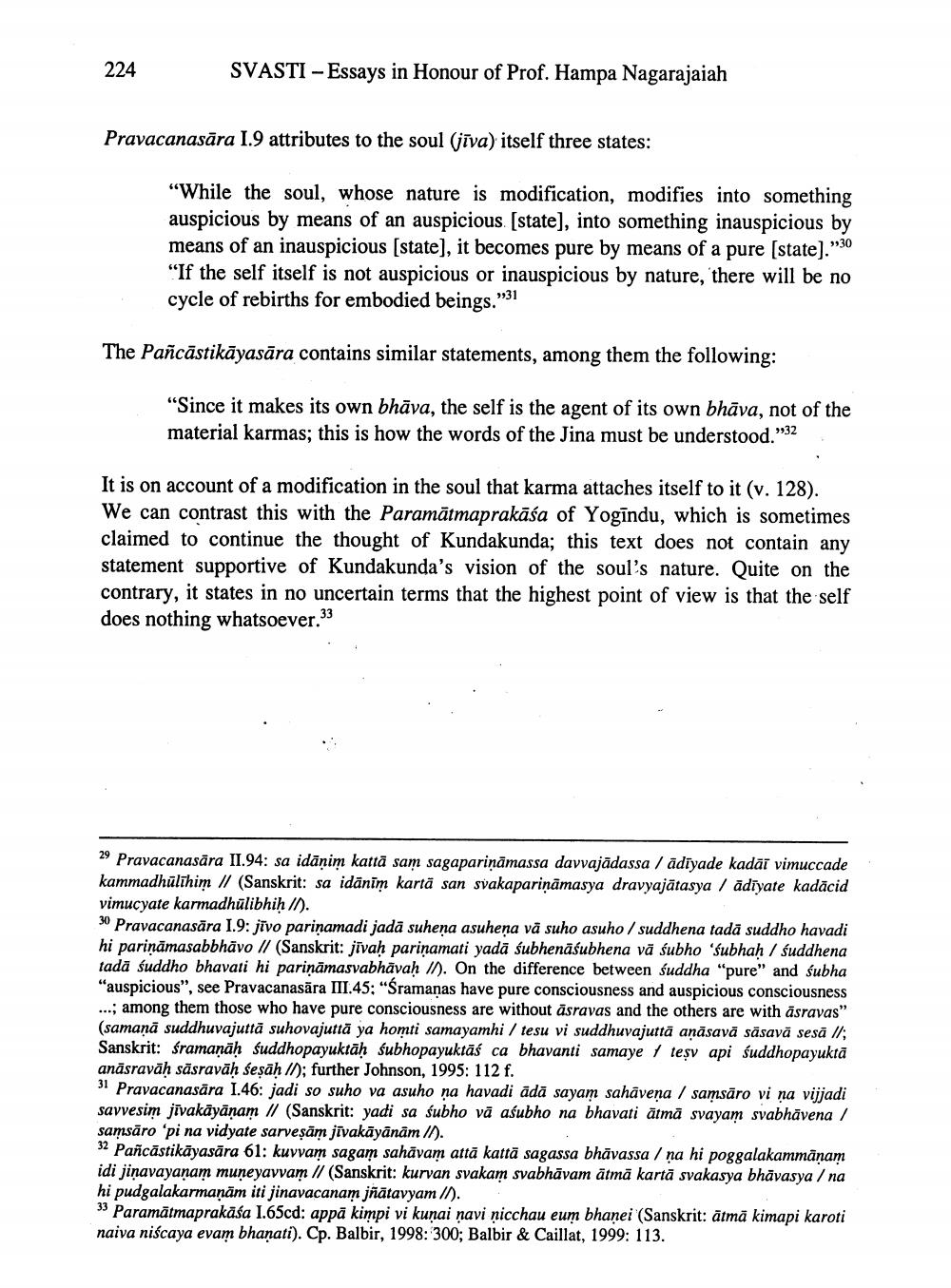________________
224
SVASTI Essays in Honour of Prof. Hampa Nagarajaiah
Pravacanasära 1.9 attributes to the soul (jiva) itself three states:
"While the soul, whose nature is modification, modifies into something auspicious by means of an auspicious [state], into something inauspicious by means of an inauspicious [state], it becomes pure by means of a pure [state]." "If the self itself is not auspicious or inauspicious by nature, there will be no cycle of rebirths for embodied beings."
The Pañcästikäyasāra contains similar statements, among them the following:
"Since it makes its own bhäva, the self is the agent of its own bhava, not of the material karmas; this is how the words of the Jina must be understood."
32
It is on account of a modification in the soul that karma attaches itself to it (v. 128). We can contrast this with the Paramätmaprakāśa of Yogindu, which is sometimes claimed to continue the thought of Kundakunda; this text does not contain any statement supportive of Kundakunda's vision of the soul's nature. Quite on the contrary, it states in no uncertain terms that the highest point of view is that the self does nothing whatsoever."
29 Pravacanasara II.94: sa idānim katta sam sagapariņāmassa davvajādassa / ādīyade kadai vimuccade kammadhalihim (Sanskrit: sa idānim kartā san svakapariņāmasya dravyajätasya / adiyate kadäcid vimucyate karmadhalibhiḥ//).
30 Pravacanasara 1.9: jivo parinamadi jadā suheņa asuheņa vā suho asuho / suddhena tada suddho havadi hi parināmasabbhāvo // (Sanskrit: jivaḥ pariņamati yada subhenäsubhena va subho 'Subhah / Suddhena tada śuddho bhavati hi parināmasvabhavaḥ //). On the difference between suddha "pure" and subha "auspicious", see Pravacanasara III.45; "Śramanas have pure consciousness and auspicious consciousness ...; among them those who have pure consciousness are without asravas and the others are with äsravas" (samana suddhuvajutta suhovajuttä ya homti samayamhi / tesu vi suddhuvajuttā aṇāsavā sāsavā sesā //; Sanskrit: framanaḥ śuddhopayuktāḥ subhopayuktas ca bhavanti samaye teşv api fuddhopayukta anāsravāḥ säsravaḥ śeṣaḥ //); further Johnson, 1995: 112 f.
31 Pravacanasara 1.46: jadi so suho va asuho na havadi ādā sayam sahāveṇa / samsāro vi na vijjadi savvesim jivakāyāṇam // (Sanskrit: yadi sa subho va aśubho na bhavati ātmā svayam svabhāvena / samsaro 'pi na vidyate sarveṣām jivakāyānām //).
32 Pañcästikäyasära 61: kuvvam sagam sahāvam attä kattä sagassa bhavassa / na hi poggalakammāṇam idi jinavayanam muneyavvam // (Sanskrit: kurvan svakam svabhāvam ātmā kartā svakasya bhāvasya / na hi pudgalakarmaṇām iti jinavacanam jñātavyam //).
33 Paramätmaprakāśa 1.65cd: appä kimpi vi kunai navi nicchau eum bhanei (Sanskrit: ātmā kimapi karoti naiva niscaya evam bhanati). Cp. Balbir, 1998: 300; Balbir & Caillat, 1999: 113.




